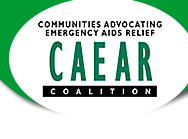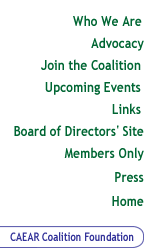



Press Releases
For Immediate Release
October 5, 2000
Contact:
Scott
Sanders
Jeff Travers
202-486-8757/ 8761
CAEAR Coalition Lauds Congressional Passage of Ryan White CARE Act Reauthorization Federal Program is Key to Health and Well-being of Thousands Living with HIV Across the Country
The U.S. House of
Representatives and Senate today unanimously passed the Ryan White CARE
Act Amendments of 2000 with broad bipartisan support in both chambers.
"For thousands of the nation's most vulnerable residents, the CARE Act represents a lifeline to the medical care, medications, and support services they need to stay alive," said Patricia Bass, Chair of the CAEAR Coalition. "The people living with HIV and AIDS in America who would be unable to afford medications or keep food on their tables without this program can rest much easier tonight."
"The CAEAR Coalition commends all Senators and Representatives who voted in favor of this life-saving legislation," continued Bass. "In particular, we thank the authors of the legislation, Senators James Jeffords (R-VT) and Edward Kennedy (D-MA) and Representatives Tom Coburn (R-OK) and Henry Waxman (D-CA) for their tireless leadership on behalf of people living with HIV and their families."
The CAEAR Coalition advocated diligently over the past two years for the reauthorization of the CARE Act. Components of the CAEAR Coalition's reauthorization campaign included the release of a position paper with recommendations for fine-tuning the CARE Act, extensive collaboration with Congressional staff drafting the legislation, and an aggressive grassroots advocacy campaign with numerous constituent visits to Capitol Hill and the delivery of thousands of postcards of support.
"We worked long and hard to ensure that this legislation reflects the day-to-day reality of people with HIV and those who provide them with care and support," said Bass. "The bill that passed today is a solid, workable framework." The CAEAR Coalition will now work with Health Resources and Services Administration (HRSA) on the implementation of the CARE Act Amendments.
"As those who coordinate the allocation of CARE dollars in local communities and as consumers of the services provided, our membership is eager to play an active role in the implementation process to ensure that CARE Act services are delivered effectively and efficiently," said Bass.
The CARE Act funds programs for low-income, uninsured or underinsured persons with HIV and AIDS. It first passed in 1990 and was reauthorized in 1996 and has had a dramatic impact on those living with HIV over the past decade. CARE Act-funded services:
- reduced AIDS mortality by 70%
- serve an estimated 500,000 people with primary care
- provide the latest drug therapy to more than 100,000 poor people living with HIV/AIDS
- curbed mother-to-child transmission of HIV by 70%.
In 2000, the CARE Act provided over $1.6 billion to support HIV and AIDS services in all 50 states, DC, and Puerto Rico. The need for CARE Act services remains great: the initial HIV Cost and Services Utilization Study, sponsored by the U.S. Public Health Service, estimates that 250,000-300,000 individuals diagnosed with HIV infection currently receive no medical treatment.
The CAEAR Coalition is a national grassroots organization advocating on behalf of people living with HIV/AIDS who rely on Title I and Title III of the CARE Act for their health care services. The coalition includes CARE Act grantees and consortia, people living with HIV/AIDS, members of Title I planning councils, and community-based AIDS service organizations.
Who We Are | Advocacy | Join the Coalition | Upcoming Events
Links | Board of
Directors | Members Only
Home
CAEAR
Coalition
P.O. Box 21361
Washington, DC 20009-1361
Phone:
202-789-3565 Fax: 202-332-7087
E-mail: http://www.caear.org/Templates/info@caear.org